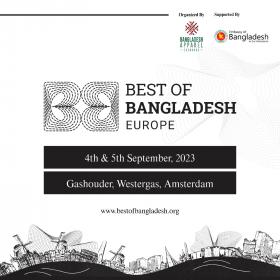First show of ‘Best of Bangladesh’ in Europe
‘Best of Bangladesh’ -- the first ever sole ‘Made in Bangladesh’ show in Europe -- aims to open the doors for Europe to experience what the Bangladeshi industries has to offer.
As Bangladesh celebrates five decades of strong ties with Europe, in order to further strengthen the ties and deepen collaborations with the partners across Europe, Bangladesh Apparel Exchange, supported by the Bangladesh Embassy in the Netherlands, is organizing the event in Amsterdam, Netherlands on September 4th and 5th, 2023.
The ‘Best of Bangladesh’ aims to serve as a dynamic platform to showcase the progress and potential across diverse sectors of Bangladesh economy, especially manufacturing.
A total of 40 Bangladeshi companies each of which is the country’s best from apparel, textile, leather, Agro, jute, handicrafts, pharmaceutical, light engineering, digital industry, FMCG and bicycle will showcase their sustainable and innovative products in the Best of Bangladesh.
Bangladesh economy ranks as the world’s 37th largest now and it’s rapidly-expanding. The ‘Best of Bangladesh’ is being organized to accelerate interests and burgeoning engagements between the entrepreneurs and private sector entities on both European and Bangladeshi sides. The event has been structured to serve as a platform to showcase the multifaceted progress made and potential across diverse sectors of Bangladesh’s economy.
There will be an inaugural and 7 interactive panel sessions at the Best of Bangladesh on the topics ‘Bangladesh – Perspectives From An Emerging Economy’, ‘Bangladesh - Your Sustainable Sourcing Destination’, ‘Empowering the Future: Advancing Safety & Well-being for Garments Workforce in Bangladesh’, ‘Bangladesh Agro-Food: A Next Opportunity for Collaboration’, ‘Impact Investing - The Next Frontier’, ‘Sustainable Synergy: Circular Economy, Climate Action & Bangladesh’s Future’, and ‘Digitization and Digital Economy in Bangladesh’.
Bangladesh Apparel Exchange













